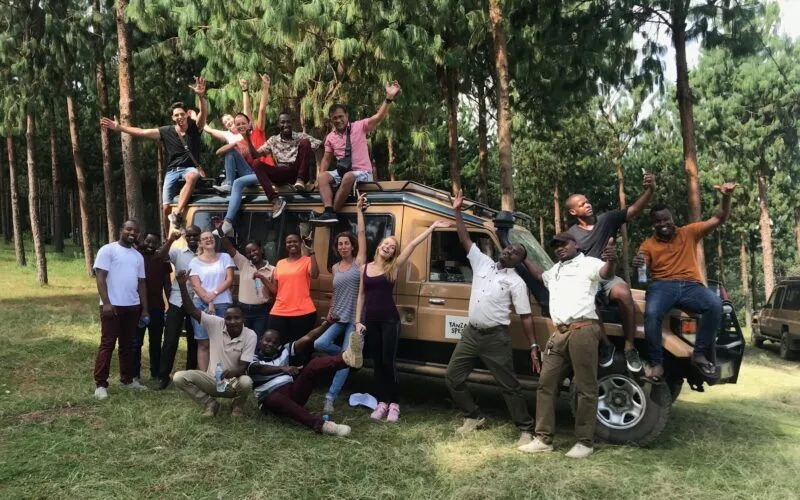Walking through the bustling markets of Dar es Salaam, one might be astonished at the seamless integration of diverse cultures. Tanzanians tend to view tourists not just as visitors, but as bridges to the wider world, eager to share their vibrant traditions. This reciprocal exchange fosters a unique opportunity for cultural immersion and mutual understanding.
Historically, tourism has been a significant pillar for Tanzania’s economy, with the sector contributing around 14% to the GDP. Many Tanzanians feel proud of their rich natural heritage, which includes iconic sites like Mount Kilimanjaro and Serengeti National Park. This pride translates into genuine warmth and hospitality extended to tourists, making them feel welcome and appreciated.

Cultural Perspective of Tanzanians on Tourism
The warm hospitality of Tanzanians often leaves visitors feeling welcomed and cared for. This friendly nature stems from deep-rooted cultural values that emphasize respect and community spirit. Tourists are seen as guests, and it’s customary to treat guests with utmost kindness and generosity. For many Tanzanians, interacting with tourists is also a way to learn about different cultures and traditions. It’s a mutual exchange that enriches both parties.
Economic benefits are another important aspect of the Tanzanian view on tourism. The influx of tourists provides jobs in hotels, restaurants, and various tourism-related businesses. According to the article, tourism has played a substantial role in boosting the local economy. This positive economic impact strengthens the overall favorable perception of tourists. It’s clear that tourism supports many livelihoods across the country.
Tanzanians take pride in their country’s beautiful landscapes and unique wildlife. They enjoy sharing these natural wonders with visitors, whether it’s through a Tanzania safari or a guided tour. The pride in showcasing their national treasures is evident in how passionately locals talk about Mount Kilimanjaro and Serengeti National Park. This enthusiasm is contagious and adds to the tourist experience.
However, there are cultural sensitivities tourists should be aware of. Respect for local customs and traditions is paramount. Tourists who show understanding and appreciation for Tanzanian culture are more likely to receive a warm welcome. In turn, this respect can foster better mutual understanding and stronger ties between visitors and locals, making the visit more enjoyable for everyone involved.
Welcoming Nature and Economic Importance of Tourism
Tanzanians are known for their warm personalities and welcoming attitudes toward visitors. Guests are treated with respect and hospitality, making tourists feel at home. This welcoming nature has become a hallmark of the Tanzanian experience. Many tourists appreciate this friendliness and often speak highly of the local people in their reviews. It creates a positive feedback loop that encourages more visitors to come.
The economic importance of tourism cannot be overstated. Tourism is a significant source of income for many Tanzanians. Jobs in the tourism sector, such as guides, hotel staff, and transportation services, are crucial for the livelihood of numerous families. Here is the article mentioning that these jobs provide stability and growth opportunities for many. The industry also supports local artisans and souvenir shops, adding another layer of economic benefit.
This economic impact extends to community development. Revenues from tourism help fund local schools, healthcare facilities, and other infrastructure projects. Many regions in Tanzania have seen improvements in living standards thanks to tourism. This creates a positive cycle, as better infrastructure attracts more tourists. It’s a win-win situation for all involved.
Additionally, tourism encourages cultural exchange and mutual understanding. Visitors learn about Tanzanian customs, traditions, and way of life, enriching their travel experience. Tanzanians, in turn, get to share their culture and gain insights into the lives of people from different parts of the world. This cultural exchange fosters goodwill and builds bridges between diverse communities.
The Impact of Tourism on Local Communities
Tourism significantly influences local communities in Tanzania, often bringing new opportunities and challenges. With the influx of visitors, there are more jobs available in areas like hospitality, guiding, and transportation. This leads to improved incomes and better living standards for many families. Additionally, it fosters a sense of pride among locals, as they see the appreciation tourists have for their culture and natural environment. The shared experience benefits both parties.
However, the impact of tourism is not solely economic. On a social level, it promotes cultural exchange and understanding. Locals have the chance to learn from visitors, while tourists gain insight into Tanzanian history and traditions. This exchange helps to break down stereotypes and promotes unity. Communities often come together to showcase their heritage through dance, music, and arts, reinforcing cultural identity.
Environmental considerations also come into play with the rise of tourism. Increased visitor numbers can lead to pressure on local resources and natural habitats. To address this, sustainable tourism practices are being promoted. These initiatives aim to minimize negative impacts while maximizing benefits. According to the article, community-based tourism projects are effective in combining conservation and economic growth.
Finally, tourism can bring about infrastructural developments. Roads, schools, and healthcare facilities in tourist hotspots often see improvements funded by tourism revenues. These developments benefit not just tourists but also the local population. The overall enhancement in infrastructure leads to improved quality of life. As a result, these communities are better positioned for long-term growth and development.
The Role of Tourism in Promoting Tanzanian Heritage
Tourism plays a vital role in highlighting and preserving Tanzanian heritage. Many tourists come to Tanzania to explore its rich history and cultural landmarks. This interest helps keep traditional practices alive and provides funding for the maintenance of historical sites. Through visits to museums, historical landmarks, and cultural villages, tourists contribute to the protection and promotion of heritage. This effort ensures that future generations can appreciate Tanzania’s past.
One significant way tourism promotes Tanzanian heritage is through cultural festivals. These events showcase traditional music, dance, and arts, drawing visitors from around the world. Festivals such as the Mwaka Kogwa in Zanzibar or the Unyago dance ceremonies are celebrated with much enthusiasm. According to the article, these events offer tourists an immersive cultural experience. They create awareness and appreciation of local traditions among international audiences.
Handicrafts and artworks further illustrate the cultural richness of Tanzania. Tourists often purchase locally made items such as Maasai beadwork, wooden carvings, and textiles as souvenirs. This practice supports local artisans and preserves traditional craftsmanship. Lists of popular Tanzanian handicrafts can be found here:
- Maasai Jewellery
- Tinga Tinga Paintings
- Kanga Fabric
- Makonde Carvings
Tour guides and local experts also play a crucial role. They educate tourists about the history and significance of various sites, enhancing the visitor experience. By sharing folklore, legends, and historical facts, guides help tourists connect more deeply with the heritage. This knowledge transfer is vital for preserving intangible cultural elements that might otherwise be forgotten.
Moreover, tourism encourages the preservation of natural heritage sites. Tanzania is home to numerous national parks and reserves that protect unique landscapes and wildlife. Visitors are drawn to the beauty of places like the Serengeti and Ngorongoro Crater. The revenue generated from these visits helps fund conservation efforts. Sustainable tourism models ensure that these natural treasures continue to thrive and be appreciated by future visitors.
Lastly, educational programs and workshops often emerge from tourism activities. Visitors can participate in learning experiences such as cooking traditional dishes, crafting items, or even understanding Swahili. This engagement promotes cultural exchange and adds depth to the tourist’s knowledge. It creates lasting memories and fosters a greater appreciation of Tanzanian culture and heritage.
Key Takeaways
- Tanzanians generally view tourists positively and enjoy sharing their culture.
- Tourism provides important economic benefits and job opportunities for locals.
- Cultural exchange through tourism fosters mutual respect and understanding.
- Tourists contribute to the preservation of natural and cultural heritage sites.
- Respectful tourists are more likely to receive a warm welcome in Tanzania.

